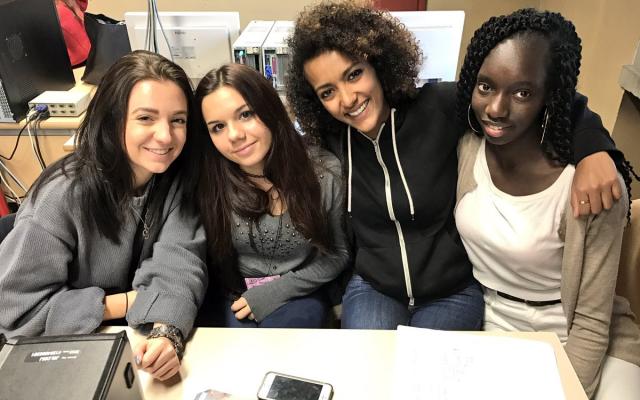Coding Girls in Mozambique: training session in the Province of Zambezia
Today, we take you to the Province of Zambezia in Mozambique, for an exchange involving the students at the Liceo Giovanni Keplero in Rome. With technology and passion, you can travel 7,000 kilometres in a few seconds, the time it takes to activate an Internet connection. Elisabetta Gramatica, who coordinates the Coding Girls in Mozambique Project, tells us about this fascinating journey, using the happy literary metaphor of Ciaula discovering the moon. Elisabetta's travel companions are Roman students who shared one of their projects, a robot for cleaning waste in marine environments, designed with the technological heart of an Arduino chipset.
How much can kids surprise us? In one of his most famous novellas, Ciàula Discovers the Moon, from Novelle per un anno (1907), Luigi Pirandello wrote: "Yes, he knew, he knew what it was; but like many things one knows, it has never been given any importance. And what could it matter to Ciàula, that there was the Moon in the sky? Now, just now, having emerged, at night, from the belly of the earth, he discovered it." The novella presents the story of Ciàula, a young boy who lives in a small town in Sicily and works as a miner. During one of his night shifts, Ciàula finds himself discovering the moon; he feels a deep and overwhelming amazement at its beauty, which filters through the ceiling of the mine. This vision fascinates and captivates him, leading him to ardently desire to be able to observe it freely every night. of wonder and contemplation of the beauty that surrounds him. Ciaula's amazement before the moon represents a moment of suspension from his daily life, made up of hard and monotonous work in the mine; it is a moment of wonder and contemplation of the beauty that surrounds him.
Well, I felt a bit like Ciàula, last Wednesday, participating in another exchange as part of the Coding Girls in Mozambique Project between twenty students from the Province of Zambezia and twelve students from the Liceo Giovanni Keplero in Rome: amazed by the resourcefulness and determination of the Italian boys who, led by team leader Sofia, took on the delicate task of leading the hour and a half exchange with the Mozambican students. And they did it perfectly.
The meeting opened with a beautiful moment during which all the connected students introduced themselves and said something about themselves, preparing the ground for a genuine exchange experience. We then continued with the exploration of the world of Arduino, a hardware platform composed of a series of electronic boards equipped with a microcontroller for rapid prototyping. The Liceo Keplero team described their Arduino project with great enthusiasm and pride: a robot designed for cleaning waste in marine environments.
Their story sparked several reflections on the multiple potentials of technology, also in the context of Mozambique. There was discussion on how a similar tool could contribute to solving problems in various sectors, such as environmental sustainability and healthcare, but also in simpler everyday situations. For example, a Mozambican student shared the idea that this technology could be used to stimulate people's memories, especially her grandmother, who "often forgets many things, even where she left her house keys."
At the end, the students from the Liceo Keplero and the girls from the Province of Zambezia were able to express their thoughts. Here's what the Italian students said: “It was a truly crazy experience being able to come into contact with people who live on the other side of the world. We were extremely enthusiastic about being able to help the girls by talking to them about our activities with the Fondazione Mondo Digitale. We sincerely hope that we helped them better understand Arduino and its operation. We will be happy to help them again when needed. The girls were very involved, setting aside their shyness and demonstrating a total involvement which gave us a lot of satisfaction. We are really very satisfied about the work done and having passed it on to other people!"
Thanks to Sofia, Olivia, Luca, Flavio, Giulia, Elena, Ludovica, Cristina, Maria Ludovica, Andrea, Flaminia, and Alessandro for sharing your project, your experiences, and your passion, and making this exchange an unforgettable and enriching experience for everyone. Thanks to Professor Gerarda Stimato and Professor Saverio Attorno for having enthusiastically welcomed this experience.
Thanks to Micol and the students from the Province of Zambezia for actively participating and contributing to making this precious intercultural exchange possible.
“[…] There it is, there it is, there it is, the Moon… There was the Moon! the moon! And Ciàula began to cry, without knowing it, without wanting it, from the great comfort, from the great sweetness he felt, in having discovered, there, while she was ascending the sky, the Moon, with its wide veil of light, unaware of the mountains , of the planes, of the valleys that it illuminated, unaware of him, who was no longer afraid of her, nor did he feel tired anymore, in the night now full of his amazement".




